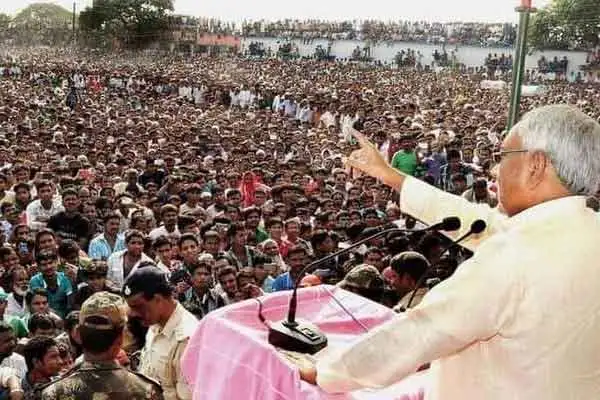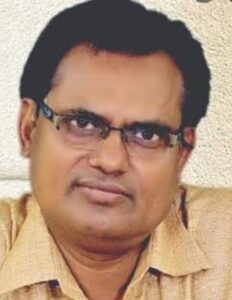
File photo of Bihar Chief Minister Nitish Kumar addressing a public rally.
Bharat Ratna to Karpoori Thakur isn’t causing a storm in a teacup but is posing a serious challenge to the ruling alliance in Bihar to stay together when general elections are approaching.
There are some serious talks about the possibility of Bihar Chief Minister Nitish Kumar severing ties with Lalu Yadav’s Rashtriya Janata Dal and rejoining the National Democratic Alliance (NDA).
Nitish, who is also the Janata Dal (United) supremo, today made a comment denouncing ‘parivarvaad‘ (nepotism) which political analysts were quick to interpret as an attack on Lalu, whose son Tejashwi Yadav is the deputy chief minister in Kumar’s cabinet.
Interestingly, Nitish commented as he alluded to the late Karpoori Thakur, a two-time chief minister of Bihar, and a prominent backward leader of his time, who would be posthumously conferred the nation’s highest civilian award, the Bharat Ratna, on the Republic Day this year.
The decision by the Bharatiya Janata Party-led NDA government has a far-reaching impact on Bihar’s caste-ridden politics, where, as per the caste census conducted by the state government, the politically sensitive 113 caste groups known as the extremely backward classes (EBCs) constitute the largest portion at 36%, along with the other backward classes (OBCs) at 27%, which amounts to 63% of the total 13 crore population of the state. The caste-wise break up in the state showed that “upper caste “ groups among Hindus, considered BJP’s mainstay, account for only 10.6% — Brahmins 3.7%, Rajputs 3.4 %, Bhumihars 2.9 % and Kayasthas 0.6 %. Muslims constitute 17.7 % of the state population.
Also read: 36 years after his death, Karpoori Thakur gets Bharat Ratna
By conferring the nation’s highest award to late Karpoori Thakur when the general elections are around the corner, Prime Minister Narendra Modi did score a brownie point over Nitish, making a significant dent into the latter’s EBC and backward vote bank. (Nitish belongs to the backward Kurmi caste).
Ostensibly realising that Modi did manage to outwit him on the issue of caste politics, today Nitish compared himself with Karpoori and said that like the latter, he too never indulged in ‘parivarvaad‘. Wasn’t that a hint to the BJP that he was interested in rejoining the NDA fold before the elections?
The announcement of Bharat Ratna for Karpoori Thakur on his birth centenary year and 36 years after his death, not just took the nation by surprise, but as looks apparent now, set the ruling alliance partners in Bihar, the JD(U) and the RJD apart.
A surprised Nitish welcomed the decision to confer Bharat Ratna on Thakur, but added a rider to his welcome: The prime minister had not informed him; he came to know from Ramnath Thakur, the son of Karpoori Thakur, about the upcoming award of Bharat Ratna.
But then, Nitish added, ‘ It was our long-standing demand’. However, RJD remained tight-lipped on the conference of Bharat Ratna on Karpoori Thakur.
The choice of Karpoori Thakur seems a masterstroke keeping in view the upcoming general election of 2024. Karpoori Thakur belonged to an EBC (Extremely Backward Community) class. Therefore, the bestowing of the highest Civilian Award upon him was like hitting two birds with a single stone: on the one hand, the Modi government can take the credit for conferring Bharat Ratna upon a man who was considered as another Lal Bahadur Shastri, in terms of honesty and probity in high office, and on the other, the polarisation of EBC for voting for the BJP for recognising them.
Not surprising, therefore, that now speculation is rife in the political circle about Nitish joining the NDA yet again, which stands further buttressed by this announcement of Bharat Ratna for Karpoori Thakur. While Nitish welcomed it, the RJD was incommunicado.
Yet, Nitish despite sporting an outward smile is ostensibly rattled by the new emerging prospect of his carefully cultivated EBC vote bank switching their loyalty to the BJP. Hence, he now articulates that it was JD9U)’s long-standing demand for Bharat Ratna to Karpoori that finally attained fruition. JD9U) says its agenda of social justice traces its source from Karpoori Thakur.
In fact, amidst all this circus jamboree, the fact remains that notwithstanding the timings of this announcement, Karpoori Thakur overwhelmingly deserved it; his strict adherence to the values and social justice, coupled with his ideological moorings, contributed towards furthering the national ethos which had its underpinnings in Bharatiyata. He robustly stood for Hindi as the principal official language to be taught in school, which is increasingly resonating with the power that be, today.
Hence, electoral arithmetic aside, Bharat Ratna Karpoori Thakur is the new social evolution in the political horizon of Bihar, and the nation.






